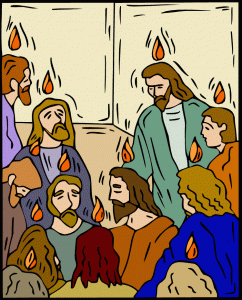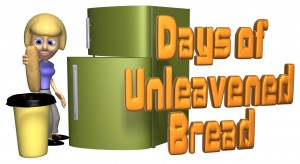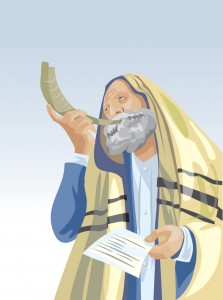To learn more, read my teaching article on Yom Teruah (aka Rosh Hashana) to learn what the end-time prophetic implications of this upcoming biblical feast are. Go to http://www.hoshanarabbah.org/pdfs/yom_teruah.pdf.
Tag Archives: Biblical Feasts
The Feast Days in the Messianic Age/Millennium
The following is a list of the scriptures that prophesy that YHVH’s people would observe the weekly Sabbath and biblical feasts during the church age and into the Millennium or Messianic Age.
- Ezek 45:17 — The Sabbaths (plural, includes the weekly and annual Sabbaths; i.e., Holy Day festivals) and solemnities (moedim) or appointed times (see also v. 9).
- Ezek 45:21 — Passover and Feast of Unleavened Bread
- Ezek 45:25 — The Feast of Tabernacles
- Ezek 46:1 — The weekly Sabbath
- Ezek 46:9 and 11 — solemn or appointed times (moedim) and feasts (Heb. chag meaning “pilgrimage feast, festival, celebration, holy day, time of dancing, cyclical/yearly seasonal event; i.e., the feast days”)
- Zech 14:16,18,19 — The Feast of Tabernacles
As you read these passages, you will see that it was not only Israel, but the nations of the world (i.e., the Gentiles) who would be celebrating YHVH’s appointed times.
It is curious to me how church leaders have told us for nearly 1900 years that the “Jewish” feasts were for the Jews only and not for the Christians. So let me get this straight: YHVH expected his people—ancient Israel—to celebrate the feasts, Yeshua celebrated them as did the early church and the apostles, yet when the Gentile church came along, they no longer had to do them, but then when Yeshua returns, YHVH will expect his people along with all the nations of the world to celebrate them, and if they don’t he will punish them for their disobedience? Something doesn’t add up here, and it’s not the Word of Elohim that’s off!
At this point, I’m reminded of the words of Yeshua in Mark 7:13, where when speaking to the religious hypercritical leaders of his day, he accused them of making of no effect the word of Elohim by their religious traditions.
Is Celebrating Shavuot (Pentecost) Optional?
Is celebrating the biblical feast of Shavuot (aka the Feast of Weeks or Pentecost) optional for the born-again, redeemed Israelite believer in Yeshua the Messiah in the 21st century?

The short answer is, “NO!” unless one considers the clear commands of the Word of Elohim to be merely suggestions and not commands. “NO!” unless one rejects following the examples of Yeshua, the Apostle Paul and the Book of Acts followers of Yeshua. “NO!” unless one has become so conditioned to following the traditions of men that have made of non-effect the Word of Elohim that they have become blind and deaf to the clear truth of the Scriptures.
You see, we live in an age where the majority of so-called “Bible believers” and church people are more concerned about feelings, popularity, majority consensus, what others think, having fun, being entertained, the lust of the flesh and eyes that most either don’t know what the Word of Elohim says, or don’t care. Oh, they will swear otherwise, but their actions speak louder than their words. Amos the prophet describes this spiritual sickness well when he referred to apostate Israel as suffering from a “famine of the hearing of the words of YHVH,” (Amos 8:11). You see, the word “hearing” in Hebrew is shema, which means not just “to hear,” but “to do and to obey” as well. It seems that nowadays, like then, a lot of folks hear, but few obey.
On May 27, 2012, we will be celebrating the biblical feast of Shavuot (Lev 23:15–22, Acts 2:1; 20:16). On this blog, and on our ministry website (hoshanarabbah.org) we have been promoting our congregation’s and our ministry’s Shavuot celebration to those in our local area (the Pacific Northwest U.S. region). Well, what prompted this blog post was an interesting response I received today from someone who thanked us for the announcement, but was sorry they couldn’t make it to Shavuot because they had a birthday party to attend instead.
So, I submit, once again, the question, is celebrating Shavuot optional? Let me list the reasons why it is not — according to the Word of Elohim:
- Shavuot is a miqra kodesh (holy convocation) and sabbath when YHVH commands his people to stop whatever they are doing, gather together, and to meet with him on this day (Lev 23:1,15–21).
- YHVH enacted Shavuot as a statute forever for his people Israel (Lev 23:21).
- If you’re a follower of and believer in Yeshua then that makes you a son of Abraham (Gal 3:29), and an Israelite (Eph 2:11–19), and so the command to observe Shavuot applies to you. Only the heathens are exempted from this celebration, and that exemption isn’t without eternal consequences, for to not obey the Torah-commands of YHVH-Yeshua is sin (1 John 3:4), and the wages of sin is eternal death (Rom 6:23).
- If you call yourself a Christian, Messianic, or a follower of Yeshua, then you’ll not want to risk being a hypocrite (or a sinner), but rather, you’ll want to do what he did and celebrate all of the biblical feasts including Shavuot. You’ll also want to follow the example of Paul who instructed us to imitate Yeshua as he imitated Yeshua by doing what Yeshua did (1 Cor 11:1). To imitate means to do exactly what someone else does. Paul celebrated Shavuot (Acts 20:16).
- If you love Yeshua, you will be keeping his Torah-commandments (John 14:15) of which Shavuot is one.
- Some believers in Yeshua feel that we only need to do what he directly commanded us to do. Well, he commanded his disciples to tarry in Jerusalem until they were endued with power from on high, which occurred on the day of Pentecost (Luke 24:49; Acts 2:1–4). Therefore, he was commanding them to celebrate it, which they continued to do as we see from the example of Paul above.
- Finally, if there is any biblical feast that has precedence to be celebrated in our day, it would be the Feast of Pentecost, since, as many of us have been taught in our churches, the NT church was birthed on this day. So, if it was good enough for them, why not for us? Moreover, it seems to me, that if there is any church group out there that should be leading the way in celebrating the biblical Feast of Shavuot or Pentecost, it should be the Pentecostals, right?
So now what’s your excuse for not celebrating Shavuot as YHVH Elohim in the Scriptures commands?
Why Study and Celebrate YHVH’s Feasts?
Here are seven biblical reasons to celebrate the feasts of YHVH Elohim:
- The biblical feasts are a prophetic shadow-picture of things to come (Col 2:16-17; Heb 10:1). When they were given to ancient Israel they pointed forward to future events that would occur to the nation of Israel. The spring feast days, for example, pointed to Messiah’s first coming while the fall feast days point to his second coming leading into the Messianic Age (Millennium) and into eternity beyond.
- All the biblical feasts point to Yeshua. The name Yeshua means “salvation” and these days all point to the various steps of the path of salvation that believers find themselves on.
- Many of the feasts point back to historical events that occurred in Israel’s history from which we can learn lessons and that are representative of our own spiritual journey (1 Cor 10:1–6, 11).
- The people of YHVH are commanded to keep what the Scriptures call the appointed times. They are times when he makes an appointment that he will meet with his people (Lev 23:1–2, 4). It is at these festivals or commanded assemblies that YHVH teaches his people about his wonderful plan of salvation or redemption of the world through Yeshua the Messiah.
- The feasts are in the Bible and the whole Bible is the inspired word of Elohim (2 Tim 3:16). Yeshua commands us to live by every word that comes out of the mouth of Elohim (Matt 4:4).
- The feasts set forth the pattern of heavenly things on earth (Heb 8:1–2, 5; 9:8–9, 23; Exod 25:8–9, 40; 26:30; Num 8:4; Ezek 43:1–6, 10–12).
- We as physical beings need physical means and methods to help us understand spiritual mysteries. YHVH gives us the natural to help us to understand the supernatural (spiritual) (1 Cor 2:9–13).
Happy Last Day of the Feast of Unleavened Bread
 Hag HaMatzot or the Feast of Unleavened Bread is the second annual festival on YHVH’s biblical calendar, and occurs on the fifteenth day of the month of the Abib, which is the day immediately following Passover (or Pesach, Lev 23:5–8). Because both of these occur back-to-back, the Jews often refer to Passover and Unleavened Bread simply as Passover Week or some similar term that places the main emphasis on the Passover. But it must be noted that, though related, these two festivals are separate in meaning and purpose. Passover pictures Israel coming out of Egypt. Upon separating from Egypt, YHVH (the LORD) then commanded the Israelites to put all leavened food products out of their houses and to eat unleavened bread (flat bread) for seven days, hence the origins of the Feast of Unleavened Bread. Additionally, the first and seventh days of this week-long event are Sabbaths, and YHVH commanded his people to hold a set-apart convocation (or gathering) on these Sabbaths.
Hag HaMatzot or the Feast of Unleavened Bread is the second annual festival on YHVH’s biblical calendar, and occurs on the fifteenth day of the month of the Abib, which is the day immediately following Passover (or Pesach, Lev 23:5–8). Because both of these occur back-to-back, the Jews often refer to Passover and Unleavened Bread simply as Passover Week or some similar term that places the main emphasis on the Passover. But it must be noted that, though related, these two festivals are separate in meaning and purpose. Passover pictures Israel coming out of Egypt. Upon separating from Egypt, YHVH (the LORD) then commanded the Israelites to put all leavened food products out of their houses and to eat unleavened bread (flat bread) for seven days, hence the origins of the Feast of Unleavened Bread. Additionally, the first and seventh days of this week-long event are Sabbaths, and YHVH commanded his people to hold a set-apart convocation (or gathering) on these Sabbaths.
What, you may ask, is the purpose of putting leavening out of one’s home and eating unleavened bread products such as matzoh for one week? This seems like a curious request by YHVH of his people. Not surprisingly, the Creator of the universe has a reason for everything. The spiritual implications are enlightening and highly relevant to the disciples of Yeshua. In commanding his people to deleaven their homes and lives, YHVH was/is teaching us an object lesson, which applies to us as much today as to the Israelites of long ago. Continue reading


